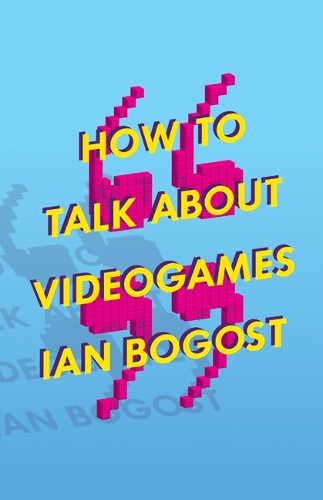
How to Talk about Videogames
(Paperback)
Publishing Details
How to Talk about Videogames
By (Author) Ian Bogost
University of Minnesota Press
University of Minnesota Press
1st February 2016
United States
Classifications
General
Non Fiction
Media studies
Graphical and digital media applications
794.8
Physical Properties
Paperback
208
Width 140mm, Height 216mm, Spine 25mm
Description
Videogames! Aren't they the medium of the twenty-first century The new cinema The apotheosis of art and entertainment, the realization of Wagnerian gesamtkunstwerk The final victory of interaction over passivity No, probably not. Games are part art and part appliance, part tableau and part toaster. In "How to Talk about Videogames," leading critic Ian Bogost explores this paradox more thoroughly than any other author to date.Delving into popular, familiar games like "Flappy Bird, Mirror's Edge, Mario Kart, Scribblenauts, Ms. Pac-Man, FarmVille, Candy Crush Saga, Bully, Medal of Honor, Madden NFL," and more, Bogost posits that videogames are as much like appliances as they are like art and media. We don't watch or read games like we do films and novels and paintings, nor do we perform them like we might dance or play football or Frisbee. Rather, we do something in-between with games. Games are devices we operate, so game critique is both serious cultural currency and self-parody. It is about figuring out what it means that a game works the way it does and then treating the way it works as if it were reasonable, when we know it isn't.Noting that the term "games criticism "once struck him as preposterous, Bogost observes that the idea, taken too seriously, risks balkanizing games writing from the rest of culture, severing it from the "rivers and fields" that sustain it. As essential as it is, he calls for its pursuit to unfold in this spirit: "God save us from a future of games critics, gnawing on scraps like the zombies that fester in our objects of study."
Reviews
"This is Ian Bogost at his best. Keen intelligence, acid wit, and a restless desire to look beyond the surface and tease out games less obvious, more important meanings."Frank Lantz, director, NYU Game Center
"No one else is as wide-ranging, funny, or inspiringly immune to cant or groupthink as Ian Bogost. How to Talk about Videogames is his most accessible and entertaining book yet."Tom Bissell, author of Extra Lives and Apostle*
"Ian Bogost can take apart a games design and tell you exactly what makes it work and what it means to us personally and to our game-playing society. How to Talk about Videogames has deep insights into a range of current topics we are dealing with or experiencing today. Theres a lot here to learn."John Romero, veteran game creator
"If you want an engaging, enjoyable tour of the video game commentary in 2015 conducted by a smart and entertaining writer, youd be hard-pressed to do much better than How to Talk about Videogames by Ian Bogost. "Boston Globe
"Whether Bogost is examining old favorites like Ms. Pac-Man or scrutinizing a flash-in-the-pan app like Flappy Bird, his outlook is thoughtful, inquisitive, and amused."Game On
"Bogost embraces the preposterousness and paradox of games as both consumer products and art, and in running with that tension he offers a compelling method of understanding and writing about them."Gamechurch.com
"[How to Talk about Videogames] has already proven indispensable to those of us interested in how video games have become such a vital artistic medium."Electronic Literature
"Ian Bogosts How to Talk About Videogames isnt just a book about gamesits a book about criticism, and where it fits in our wider culture. Bogost is the rare academic writer whose work is as clear and exciting as the best of the mainstream, and whose critical exercises backfire by becoming enormous commercial/popular successes."Boing Boing
Author Bio
Ian Bogost is Ivan Allen College Distinguished Chair in Media Studies and professor of interactive computing at the Georgia Institute of Technology. He is the author of many books, including How to Do Things with Videogames and Alien Phenomenology: Or, What It's Like to Be a Thing(both Minnesota), as well as Unit Operations: An Approach to Videogame Criticism and Persuasive Games: The Expressive Power of Videogames. He is the award-winning game designer of A Slow Year, Cow Clicker, and more.
